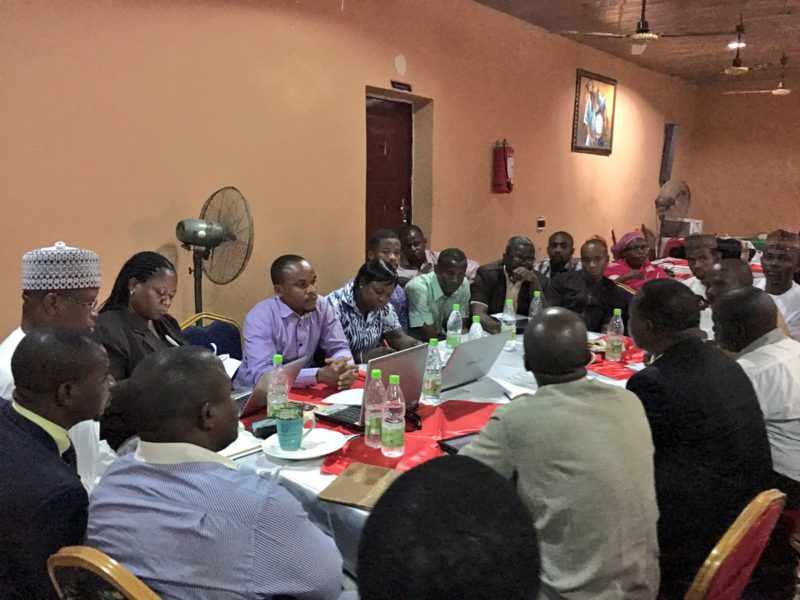Preparing the Third National Communication (TNC) report presents enormous opportunity for the collection of relevant climate data that will help Nigeria to better plan its economy and also respond to global challenges of climate change and commitments.

Permanent Secretary, Federal Ministry of Environment, Dr. Shehu Ahmed, made the submission on Tuesday, May 2, 2017 in Keffi, Nasarawa State in an opening remark at the inception workshop for the preparation of the country’s TNC to the United Nations Framework Convention on Climate Change (UNFCCC).
According to him, the TNC should present an opportunity to transform the process from merely reporting to development of a strategic and policy support tool.
A National Communication is a report that each Party to the UNFCCC submits every four years to its secretariat. It provides information on emissions and removals of greenhouse gases (GHGs), information about the status of climate change in the country, and details of the activities a Party (country) has undertaken to implement the Convention.
Nigeria prepared and submitted its First (FNC) and Second National Communications (SNC) to the UNFCCC Secretariat in November 2003 and June 2014 respectively.
Director, Department of Climate Change in the Federal Ministry of Environment, Dr. Peter Tarfa, said in a welcome address at the two-day event that the purpose of preparing National Communications is to ascertain the level of GHG composition in the atmosphere, as well as the Vulnerability, Adaptation and Abatement analysis of impacts of climate change.
It also serves as a basis for reference on future auditing of GHG inventory in the country, he added, saying:
“As we are gearing up now for the preparation of the Third National Communication, we need data, more especially primary and spatial data to understand the processes at play and build projections we can trust. These are essential for sustainable development planning and strengthening resilience in our communities. Also, we need to fill the knowledge gap observed in the Biennial Update Reports (BUR) and the previous National Communications.”
Country Director, United Nations Development Programme (UNDP), Mandisa Mashologu, submitted that the TNC takes on a whole new significant meaning.
She said: “It is coming on the heels of the country’s active participation in the negotiations, ongoing development of a Nationally Determined Contributions (NDC) and ratification of Paris Agreement by the President, with which Nigeria has clearly demonstrated political will and commitment to tackling climate change.
“This is why a national institutional framework approach, which will ensure full participation of relevant MDAS in the identification of potential for options for GHG emissions reduction across all sectors, sourcing of the necessary data is being promoted to improve the quality and consistency of the data and ensure reliability.”
According to her, the UNDP, in partnership with the Federal Ministry of Environment has over the years invested in the preparation, collection and validation of data on GHG emissions which resulted in the successful preparation and submission of Nigeria’s First and Second National Communications to UNFCCC.
“The Third National Communications (TNC) will therefore be building on the strong national capacities developed with the support of UNDP and lessons learnt over the years,” she emphasised.
Dr. Ahmed reiterated the nation’s commitment to implementing the overall mandate of the climate change convention and its protocol.
“We will continue to work towards the provision of adequate budgetary allocation for climate change activities. This present administration acknowledges that inaction is even far more expensive as it will hinder the actualisation of Mr. President’s Change Mantra and the Sustainable Development Goals.”
Nigeria signed the Paris Agreement in September 2016, committing the country to pursue efforts towards its implementation. Also, it submitted a somewhat ambitious Intended Nationally Determined Contribution (INDC), now NDC, of a conditional commitment of 45%, and an unconditional commitment to further reduce GHG emissions by 20% by 2030.
Dr Ahmed stated: “Presently, activities towards the development of the sectoral plan for implementation of NDC are ongoing. Besides putting great efforts to access global climate finance through the development of a Nigeria National Readiness Plan for assessing the Green Climate Fund (GCF), we are developing pipeline of projects to be submitted to the GCF for funding.
“Moreover, we are interfacing with the National Assembly to develop a robust Legislative Framework to strengthen policy and actions on climate change and to provide measures that are developmental, evidence based, balanced and fully integrated in line with national aspirations.”
By Michael Simire
